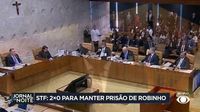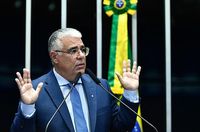The need for reforming Brazil's electoral financing system was a key consensus during a debate on Brazilian democracy held at Harvard University. The discussion was fueled by growing suspicions that organized crime is becoming increasingly involved in electoral processes. "Regarding the problem of money in electoral campaigns, we may need to review this system. Today, it is almost entirely funded by public money, and there are even talks of criminal organizations being involved in campaigns," stated Supreme Federal Court Minister Gilmar Mendes. Mendes participated in the debate titled "Resilience of Brazilian Democracy," organized by the Brazilian Association of Students and Academics at Harvard (HBASS) and the Brazil Caucus at the Harvard Kennedy School.
His comments followed remarks from Deputy Tabata Amaral (PSB-SP), who highlighted the 2024 municipal campaign, which was marred by allegations of illegal financing, including funds from criminal organizations. "We are witnessing the Mexicanization of Brazilian politics. Organized crime, such as the PCC, which controls territories, is also advancing into electoral campaigns with cash from crime to finance candidates," Amaral said. "There hasn't been an open conversation about this in Brazil yet. We need a transnational approach," she added.
During the same panel, Bruno Dantas, a minister from the Court of Accounts of the Union (TCU), noted that despite various attacks, the 2022 electoral process was remarkably successful, yielding quick and reliable results while preserving democratic values. "The Brazilian system proved to be very trustworthy," he remarked, pointing out that the challenges to the electoral system were unfounded. However, Dantas emphasized that democracies must have a network of institutions to defend democracy and their own institutions. "Institutions must show loyalty to the Constitution and work together to uphold the law," he stated.
In a separate development, the Supreme Federal Court suspended the trial concerning funeral services provided by concessionaires in São Paulo. There is currently no date set for a new hearing. The suspension occurred after Minister Gilmar Mendes requested prominence in the trial that was evaluating a precautionary measure proposed by Minister Flávio Dino. In March, Dino had ordered that cemeteries revert to the prices for funeral services that were in effect before the concession, adjusted for inflation (IPCA) during that period.
The vote had been leaning towards four votes against Dino's injunction and two in favor of maintaining the imposed determinations. The PCdoB initiated the Argument of Non-Compliance with Fundamental Precept (ADPF) in November, questioning the legality of the concession of funeral services to private entities for 22 cemeteries and one crematorium in São Paulo. The party raised concerns about the lack of transparency in the pricing table, as well as abusive charges for funerals and burials, and the difficulty for low-income individuals to access free services.
In response to these allegations, Dino had granted a partial precautionary measure, mandating that the Municipality of São Paulo restore funeral service prices to pre-privatization levels. The concessionaires and the administration of Ricardo Nunes (MDB) have claimed to charge less than what was established by Dino's decision and assert that they have provided documentation to the Court to support their claims. Prior to the Supreme Court's decision, representatives from the concessionaires had been summoned to the São Paulo City Council for clarifications. Meanwhile, a report from the City Court of Accounts (TCM) revealed unidentified human bones and funeral materials mixed with excavation works in ten cemeteries across the city, prompting the agency to demand responses from the concessionaires and the City Hall regarding the maintenance of these facilities.
On April 8, 2025, Minister Gilmar Mendes declared that granting amnesty to those involved in the January 8, 2023, events would amount to the "consecration of impunity." Mendes pointed out that individuals from the Special Forces were authorized to kill the president, vice president, and Minister Alexandre de Moraes. His statements came two days after a pro-Bolsonaro demonstration in São Paulo, which allegedly advocated for amnesty but was filled with rhetoric supporting former President Jair Bolsonaro, who is currently facing charges in the Supreme Court related to a coup plot.
Gilmar Mendes has a history of granting a significant number of habeas corpus petitions. Between 2009 and the end of 2019, he individually signed 620 such orders. In 2016, he voted in favor of imprisonment in the second instance, reversing his earlier stance, which led to the release of Lula and others. In the Lava Jato case, he ordered 21 releases in under 30 days. Mendes previously boasted about the Supreme Court's role in shielding politicians from the anti-corruption task force, stating, "Many of the characters here today, from all political quadrants, are only here because the Supreme Court confronted Lava Jato. Otherwise, they wouldn't be here. This includes the President of the Republic. Therefore, it's necessary to understand the role the Court played."
Senator Eduardo Girão (Novo-CE) recently denounced a conflict of interest involving the Brazilian Football Confederation (CBF) and an institute linked to Gilmar Mendes. Girão criticized Mendes's decision to annul the removal of the CBF president, Ednaldo Rodrigues, determined by the Court of Justice of Rio de Janeiro. He alleged a conflict of interest due to a contract between the CBF and the Brazilian Institute of Teaching, Development and Research (IDP), founded by Mendes. Girão has requested to summon Rodrigues before the Sports Committee (CEsp) and sent an official letter to the CBF seeking clarification.
"It is humanly impossible to have alternation of power within the CBF. The last time Brazil won the World Cup was in 2002. Since then, we have seen a succession of privileges, scandals, and mismanagement, which affects performance on the field and tarnishes the country's image," Girão stated. He expressed solidarity with journalists who were dismissed from ESPN after reporting on the allegations raised by the magazine Piauí.
As Brazil grapples with these multifaceted challenges, the discussions surrounding electoral financing, public service management, and judicial integrity continue to evoke strong opinions and highlight the need for transparency and accountability within its democratic institutions.








